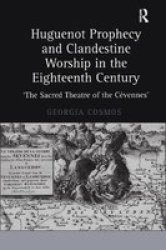Description
The Huguenots were a Protestant group that faced persecution in France after the revocation of the Edict of Nantes in 1685. Many Huguenots fled to other countries, while others continued to meet clandestinely for worship and to organize resistance to government policy. This led to the Camisard rebellion of 1702-10, during which a distinct culture of prophecy and divine inspiration grew up. This study looks at the nature of Huguenot prophesying in the Cevennes during the early years of the eighteenth century, as well as the reactions of the Huguenot community of London.
Following Louis XIV's revocation of the Edict of Nantes in 1685, French protestants faced the stark choice of abandoning their religion, or defying the law. Many fled abroad, whilst others continued to meet clandestinely for worship and to organise resistance to government policy, culminating in the bloody Camisard rebellion of 1702-10. During this period of conflict and repression, a distinct culture of prophecy and divine inspiration grew up, which was to become a defining characteristic of the dispersed protestant communities in southern France. Drawing on a wide range of printed and manuscript material, this study, examines the nature of Huguenot prophesying in the Cevennes during the early years of the eighteenth century. As well as looking at events in France, the book also explores the reactions of the Huguenot community of London, which became caught up in the prophesying controversy with the publication in 1707 of "Le Theatre Sacre Des Cevennes". This book, which recounted the stories of exiles who had witnessed prophesying and miraculous events in the Cevennes, not only provided a first hand account of an outlawed religion, but became the centre of a heated debate in London concerning 'false-prophets'. By exploring French protestantism through voluntary testimonies given by Huguenot exiles in London, this study not only offers a rare glimpse of a forbidden religion, but also shows how a long-established immigrant church in London confronted the problems posed by recent arrivals infused with a radical sense of mystic purpose and divine revelation.
